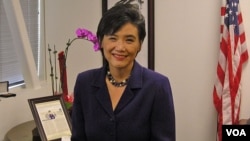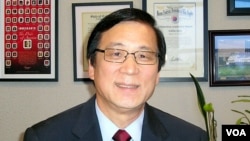LOS ANGELES —
A record 21 Asian Americans are vying for seats in the U.S. Congress on Election Day. The numbers reflect the fact that Asian Americans are the fastest growing demographic group in the country.
California Congresswoman Judy Chu chairs the Congressional Asian Pacific American Caucus, and wants increase Asian American involvement in the U.S. political process.
Chu became the first Chinese American woman elected to the U.S. House of Representatives in 2009. Her late grandfather immigrated to the United States from China’s Guangdong Province in 1904. Her mother was from the same area, and she said their experiences give her an understanding of more recent immigrants today.
“There are so many immigrants who have language barriers, or who simply are not informed what resources there are for them to succeed,” Chu said. She spoke about her grandfather, who ran a Chinese restaurant, in a televised speech to the Democratic National Convention in September.
Chu currently represents East Los Angeles and El Monte, a city in Los Angeles County that has a significant Latino and Asian population. This year, however, Chu is competing for a new congressional seat, one created by a California commission charged with ensuring fair representation.
Chu is urging voters to support the reelection of U.S. President Barack Obama. And she says Asian Americans will have a big say in whether he wins.
“Asian Americans are the swing vote in about three battleground states, Virginia, Nevada and Florida,” Chu said. “They constitute a sizeable group and if they all go for a particular candidate, they could save the election.”
Chu believes Mr. Obama’s record on issues important to Asian Americans, such as education and small business, merit his reelection.
“For so many Asian Americans, education is the key to upward mobility,” Chu said. “Small business is extremely important for many immigrants who may not have another way of making a living.”
Another potential member of the California congressional delegation is Irvine Mayor Sukhee Kang.
Kang emigrated to the U.S. from South Korea in 1977. He became involved in politics following the Los Angeles riots of 1992, which were sparked by the acquittal of four Los Angeles police officers accused of beating an African American crime suspect. Many shops belonging to Koreans and other Asians were looted in the subsequent violence.
“As I was watching TV that night, I saw all the businesses burning down to the ground,” he said. “I felt there was injustice and I felt the need to get involved.”
Kang became active in Korean-American organizations, was elected to Irvine’s City Council, and then won election as mayor in 2008. “As a result of the election of 2008, I became the first Korean-American mayor in a major U.S. city.”
Kang said he has succeeded in office despite being a Democrat in the traditionally Republican Orange County, just south of Los Angeles. He is attempting to unseat incumbent Congressman John Campbell, a Republican.
“There are a lot of partisan politics being played, however, I’m always on the side of the people, whatever that needs to be taken care of was my priority rather than partisan politics,” he said. “Luckily, a lot of people respected that and during the last four years, during the economic downturn, the city has been able to balance the budget every year.”
Kang says Asian Americans don’t fall into one political camp - some are Democrats, some are Republicans, and some Independents. “Asian Americans are very quiet at times and it took a long time to learn what it means to be in politics,” he said. “It does make a tremendous difference when you are at the table.”
Meanwhile, South Korea is viewing Kang’s congressional campaign with great interest. If elected, he would become the only Korean-American member of Congress. “People say that Sukhee Kang is a rock star in Korea, I think they look at me as one of their own even though I immigrated to the U.S. 35 years ago,” he said. “I’m getting a lot of encouragement.”
California Congresswoman Judy Chu chairs the Congressional Asian Pacific American Caucus, and wants increase Asian American involvement in the U.S. political process.
Chu became the first Chinese American woman elected to the U.S. House of Representatives in 2009. Her late grandfather immigrated to the United States from China’s Guangdong Province in 1904. Her mother was from the same area, and she said their experiences give her an understanding of more recent immigrants today.
“There are so many immigrants who have language barriers, or who simply are not informed what resources there are for them to succeed,” Chu said. She spoke about her grandfather, who ran a Chinese restaurant, in a televised speech to the Democratic National Convention in September.
Chu currently represents East Los Angeles and El Monte, a city in Los Angeles County that has a significant Latino and Asian population. This year, however, Chu is competing for a new congressional seat, one created by a California commission charged with ensuring fair representation.
Chu is urging voters to support the reelection of U.S. President Barack Obama. And she says Asian Americans will have a big say in whether he wins.
“Asian Americans are the swing vote in about three battleground states, Virginia, Nevada and Florida,” Chu said. “They constitute a sizeable group and if they all go for a particular candidate, they could save the election.”
Chu believes Mr. Obama’s record on issues important to Asian Americans, such as education and small business, merit his reelection.
“For so many Asian Americans, education is the key to upward mobility,” Chu said. “Small business is extremely important for many immigrants who may not have another way of making a living.”
Another potential member of the California congressional delegation is Irvine Mayor Sukhee Kang.
Kang emigrated to the U.S. from South Korea in 1977. He became involved in politics following the Los Angeles riots of 1992, which were sparked by the acquittal of four Los Angeles police officers accused of beating an African American crime suspect. Many shops belonging to Koreans and other Asians were looted in the subsequent violence.
“As I was watching TV that night, I saw all the businesses burning down to the ground,” he said. “I felt there was injustice and I felt the need to get involved.”
Kang became active in Korean-American organizations, was elected to Irvine’s City Council, and then won election as mayor in 2008. “As a result of the election of 2008, I became the first Korean-American mayor in a major U.S. city.”
Kang said he has succeeded in office despite being a Democrat in the traditionally Republican Orange County, just south of Los Angeles. He is attempting to unseat incumbent Congressman John Campbell, a Republican.
“There are a lot of partisan politics being played, however, I’m always on the side of the people, whatever that needs to be taken care of was my priority rather than partisan politics,” he said. “Luckily, a lot of people respected that and during the last four years, during the economic downturn, the city has been able to balance the budget every year.”
Kang says Asian Americans don’t fall into one political camp - some are Democrats, some are Republicans, and some Independents. “Asian Americans are very quiet at times and it took a long time to learn what it means to be in politics,” he said. “It does make a tremendous difference when you are at the table.”
Meanwhile, South Korea is viewing Kang’s congressional campaign with great interest. If elected, he would become the only Korean-American member of Congress. “People say that Sukhee Kang is a rock star in Korea, I think they look at me as one of their own even though I immigrated to the U.S. 35 years ago,” he said. “I’m getting a lot of encouragement.”






